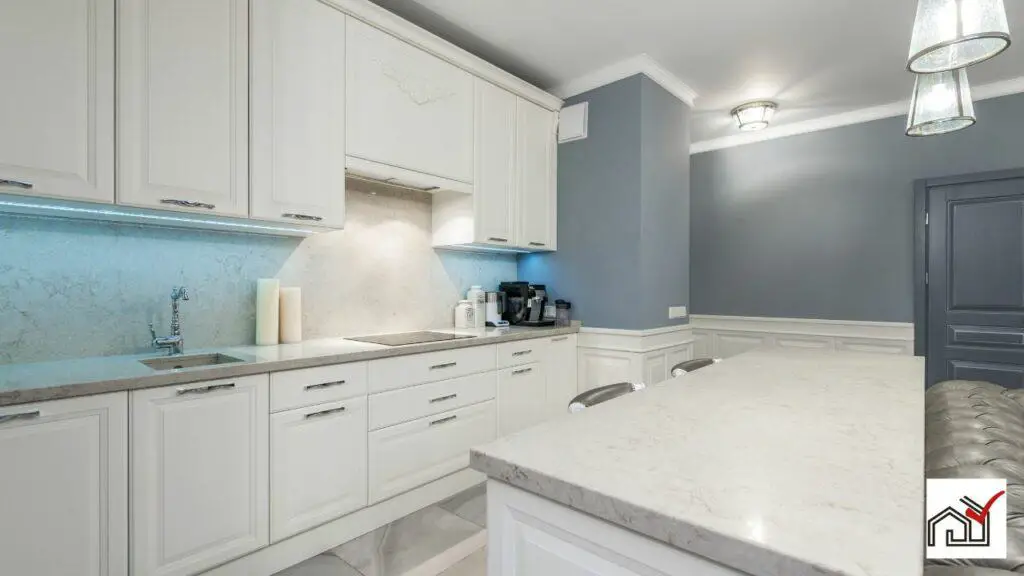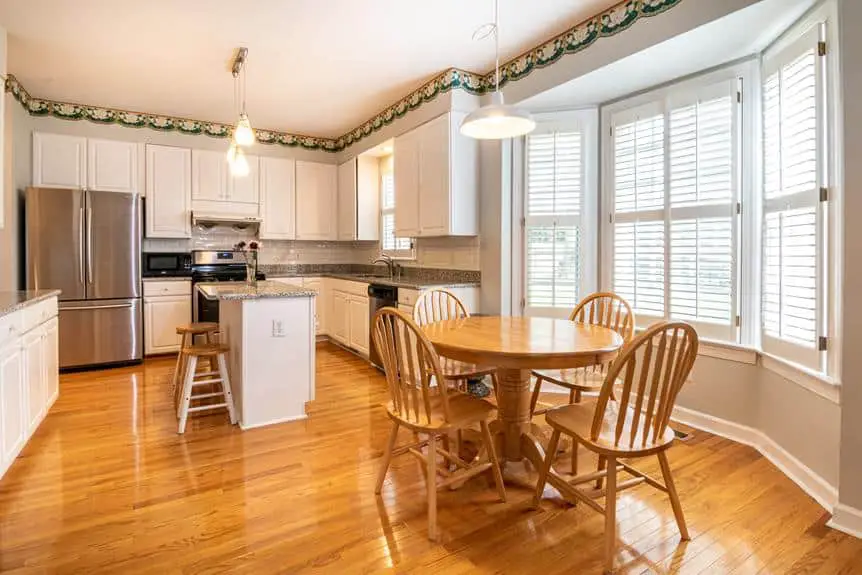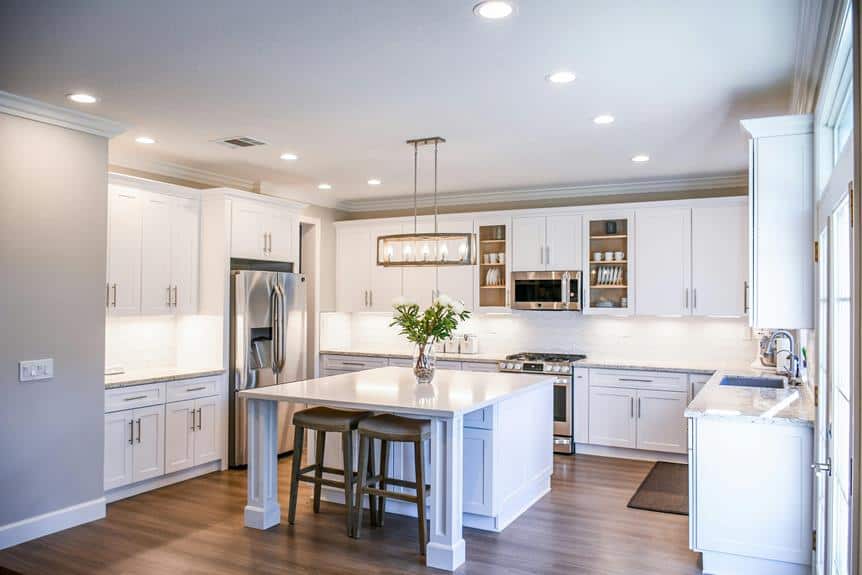Are you looking for a stylish and durable countertop?
Porcelain countertops are an excellent choice for any home, but how much do they cost?
Average Cost of Porcelain Countertops
On average, the cost of a porcelain countertop varies from $55 to $120 per square foot. However, the final cost of installing a porcelain countertop varies a lot based on its type of finish, where it’s installed, whether it’s a slab or tile, its edge profile, and the labor required to install it.
Read on to learn more about the cost of porcelain countertops and how you can get the best value for your money.
5 Factors that Affect the Cost of Porcelain Countertops
When it comes to the cost of porcelain countertops, there are several factors that can affect their price.
Let’s take a closer look at each of the factors.
1. Porcelain Countertop Type (Slab or Tile)
When considering a porcelain countertop, there are two options – tiles or a slab of gauged porcelain.
The material cost of gauged porcelain slabs is around $8 to $12 per square foot, and that of porcelain tiles is around $3 to $20.
While the material cost doesn’t differ significantly between the two, the installation cost of gauged porcelain slabs is much higher.
The big difference in cost is because gauged porcelain slabs can be 10 feet long and about 12 mm thick.
This makes them very fragile and challenging to work with until installation.
On the plus side, it gives your countertop an elegant look that tiles can’t provide.
Tiles, on the other hand, are much easier to work with as far as installation is concerned.
However, they don’t come with the unique look that a slab offers.
So the final cost will depend on your preference for the type of porcelain countertop.
2. Installation Location
When it comes to installing porcelain countertops, the location of installation will drastically affect their cost.
For example, installing a countertop in the kitchen costs a lot more than in the bathroom.
Let’s take a quick look at the costs of installing a porcelain countertop in various prominent areas of your house.
I. Bathroom
When you install a porcelain countertop in your bathroom, its cost can range from as little as $120 to as much as $1400.
It all depends on whether you choose a tile or slab and the size of your countertop.
Going with tiles instead of slabs will keep costs low, while larger countertops or gauged slabs will be more expensive.
Ii. Outdoor
When it comes to installing a porcelain countertop outdoors, the cost will again vary depending on the size and type of porcelain you use.
For example, the cost of installing an outdoor porcelain tile countertop will typically range from $240 to $600.
On the other hand, a gauged porcelain countertop will cost more than that.
Typically, the cost of installing an outdoor porcelain countertop will range from $240 to $2400, depending on the size of the countertop and the complexity of the installation.
Iii. Kitchen
On average, a kitchen countertop made from porcelain will cost you anywhere from $600 to $4800.
This price range obviously depends on what type of porcelain countertop you decide to use (slab or tile) and the size of the countertop itself.
3. Type of Finish

One of the most important factors that affect the cost of a porcelain countertop is the type of its finish.
Polished porcelain countertops are usually a bit more expensive than unpolished ones.
Unlike granite countertops, it’s not possible to change a porcelain countertop’s finish; whatever you choose at the store is what you’ll have to live with.
That means if you find yourself drawn to a certain color or pattern in a polished finish, then that’s what you will have to buy.
You can’t get that countertop honed.
Coming to the cost, a polished countertop’s price will range from $9 to $12 per square foot, and that of an unpolished countertop will range from $8 to $11.
4. Labor Required for Installation
If you plan on installing porcelain countertops, you should be aware that labor can have a huge effect on the final cost of your countertop.
For porcelain tile countertops, labor costs are typically quite low, generally between $7 to $10 per square foot.
However, labor costs will be significantly higher if you’re looking to install a porcelain slab countertop.
The labor cost for porcelain slab countertops may range anywhere from $47 to $108 per square foot.
Labor is expensive for porcelain slabs because they are fragile to handle during fabrication, transportation, and installation.
However, they are extremely durable once installed.
If you would like to get an accurate quote, it’s best to contact a local countertop installer in your area.
5. Choice of Edge Profile
The edge profile of your porcelain countertop is another crucial factor to consider when calculating the cost of your new countertop.
While you may prefer specific styles of edges, like ogee or bullnose, these are not always possible due to the thin and fragile nature of a porcelain slab.
Moreover, they will cost you anywhere from $10 to over $25 per linear foot, depending on the edge profile you are after.
That’s why square or mitered edges are most commonly used for porcelain countertops because they are easy to make and don’t add anything extra to the cost of the countertop.
Ultimately, the choice of edge you pick will have an effect on the total cost of your porcelain countertop.
Does the Color of A Porcelain Countertop Affect Its Cost?
Porcelain tiles and gauged slabs come in many colors.
Popular colors include black, white, and tan.
But there are many more options too that look just like marble and slate.
Since porcelain is man-made, color doesn’t directly affect the cost of porcelain countertops.
Irrespective of the color, the prices of most porcelain slabs range from $8 to $12 per square foot.
However, if you need specific cutouts or edge treatments, then these will add to the cost.
To save money, opt for smaller slabs or tiles.
Interesting Reading: 10 Main Differences Between Porcelain and Quartz Countertops
Takeaway
The cost of a porcelain countertop varies depending on the:
- Porcelain countertop type,
- Installation location,
- Type of finish,
- Labor required, and
- Choice of edge profiles.




